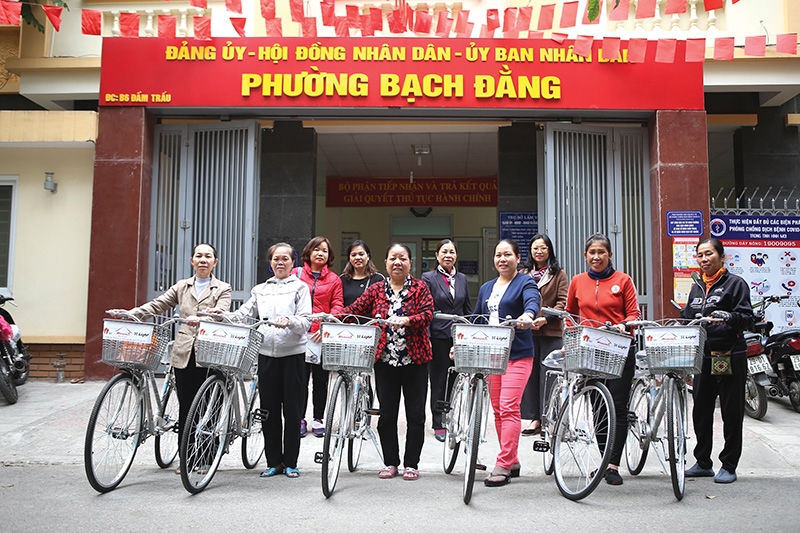The migrant women who never quit
 |
| To support each other in overcoming hardships, several migrant women organised themselves in a network |
Over 30 years ago, Do Thi Hong said goodbye to the poor countryside in Nghia Hung district of Nam Dinh province to bring her seriously ill mother to Hanoi to find work and get medical treatment. With no qualifications and no experience, Hong could only apply for odd jobs such as washing dishes, serving in restaurants, and selling at street vendors.
In the end, Hong decided to go with the scrap-buying business because the job was not limited in terms of time, and she could take advantage of the opportunity between shifts to take care of her mother.
More than three decades have passed but Hong still cannot afford a house. She, her mother, and daughter live in a cramped room in Hanoi’s iconic Hoan Kiem district. She said that most of her monthly income is spent on medical treatment for her mother, and the rest is just enough to pay for living expenses.
Then last year came the pandemic. “During social distancing I was unable to work and had no money to buy rice. We just dared to buy VND5,000 (20 US cents) of noodles each day. I never imagined I would be in such a dire situation,” said Hong.
Such difficulties did not discourage Hong. She looked for charity distribution sites for the poor to ask for support. She quickly went back to work when she could, but also joined a network of migrant workers – all who had the desire to create a community to share and help each other in times of difficulty.
“Women in freelance jobs are already working hard. But as a freelancer and far from home, and staying for decades in shabby lodgings like us is even harder. I wanted to do something to help me and others in the same situation,” Hong explained.
According to the General Statistics Office, there are 6.4 million migrants nationwide, accounting for 8.6 per cent of the workforce in Vietnam. Females make up a higher rate than men in the total migrant population and the unemployment rate of female migrants in 2020 was 2.85 per cent; and 2.20 per cent for men.
Although labour migration can create more opportunities to increase the power of women in Vietnam, according to the International Labour Organization the positive effects of migration for them may be limited. This disparity is even more pronounced for untrained, educated, and unskilled female workers, making it harder for them to access assistance.
According to Elisa Fernandez Saenz, country representative of the United Nations Women Vietnam, female migrant workers will be more vulnerable to violence, abuse, and exploitation. In general terms, the pandemic has affected the employment and income of more than 32 million workers. Along with that, the average income of informal workers is often much lower than that of formal ones with no social insurance or unemployment benefits, and also have difficulties in accessing social security.
In order to help female migrant workers like Hong, many social organisations have implemented programmes to stabilise their lives as quickly as possible. In one case, the women’s unions of Thinh Liet ward in Hoang Mai district and Bach Dang ward of Hai Ba Trung district in Hanoi have recently provided equipment including bicycles, trolleys, and a gas stove to 12 female migrant workers working as scrap collectors and street vendors after being affected by COVID-19’s ramifications.
In addition, forums and seminars are also being held so that through representative organisations, they can offer their voices. Nguyen Thu Giang, deputy director of the Light Institute for Public Health Development, felt sad when hearing female freelancers share that they have little or no access to support. In times like these, all she could do was encourage them to keep persevering.
“Nobody knows if the pandemic will ever end, or if there will be other pandemics after that,” said Giang. “Therefore we are advocating bringing the interests of disadvantaged groups, including women migrant workers, into regular government regulations with the aim of tackling overall safety problems, so that no-one will go hungry or feel abandoned at any given time.”
What the stars mean:
★ Poor ★ ★ Promising ★★★ Good ★★★★ Very good ★★★★★ Exceptional
 Tag:
Tag:
Related Contents
Latest News
More News
- NAB Innovation Centre underscores Vietnam’s appeal for tech investment (January 30, 2026 | 11:16)
- Vietnam moves towards market-based fuel management with E10 rollout (January 30, 2026 | 11:10)
- Vietnam startup funding enters a period of capital reset (January 30, 2026 | 11:06)
- Vietnam strengthens public debt management with World Bank and IMF (January 30, 2026 | 11:00)
- PM inspects APEC 2027 project progress in An Giang province (January 29, 2026 | 09:00)
- Vietnam among the world’s top 15 trading nations (January 28, 2026 | 17:12)
- Vietnam accelerates preparations for arbitration centre linked to new financial hub (January 28, 2026 | 17:09)
- Vietnam's IPO market on recovery trajectory (January 28, 2026 | 17:04)
- Digital economy takes centre stage in Vietnam’s new growth model (January 28, 2026 | 11:43)
- EU Council president to visit Vietnam amid partnership upgrade (January 28, 2026 | 11:00)






















 Mobile Version
Mobile Version